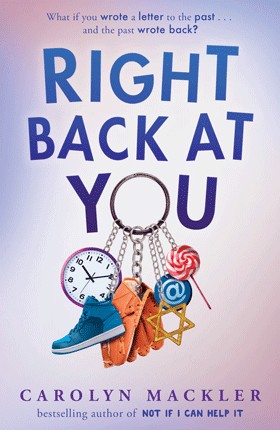| Right back at you Author: Mackler, Carolyn | ||
| Price: $23.08 | ||
Summary:
In order to cope with his parents splitting up and bullying from a classmate, Mason writes a personal letter to Albert Einstein as part of a class assignment. Unsatisfied with the first draft, he tosses it into his closet and the next day gets a letter from a Jewish girl named Talia who lives in 1987. And so begins their ongoing correspondences across time as they confide in each other.
| Accelerated Reader Information: Interest Level: MG Reading Level: 4.40 Points: 5.0 Quiz: 553469 |
Reviews:
Kirkus Reviews (01/01/25)
School Library Journal (02/01/25)
The Bulletin of the Center for Children's Books (00/02/25)
Full Text Reviews:
Other - 01/06/2025 Ever since his father abandoned the family and his school bully upped the ante on his taunting, middle schooler Mason has been having a tough time. When his therapist asks him to "write a letter to anybody or nobody," Mason addresses his correspondence to Albert Einstein, hoping the theoretical physicist can use time travel to "transport me to a time and place where things aren’t as sucky." He then throws the letter in his closet and, to his surprise, receives a response the next day from someone named Talia. Even stranger is that, while Mason lives in 2023 New York City, Talia purportedly hails from 1987 western Pennsylvania. Soon, the 12-year-olds are communicating regularly across space and time via their closets, and Mason learns that Talia is teased for being Jewish, her best friend is freezing her out, and the baseball coach won’t let her try out for the team because she’s a girl. Mackler (Not if I Can Help It) moves the plot along swiftly and satisfyingly as the resourceful white-cued protagonists use the time difference to encourage each other to move beyond their comfort zones. Ages 9-12. Agent: Jodi Reamer, Writers House. (Mar.) - Copyright 2025
School Library Journal - 02/01/2025 Gr 4–8—Twelve-year-old Mason has been instructed by his therapist, Barb, to write a letter about his unhappy life to "anybody or nobody," so he writes a letter to Albert Einstein and hides it in his closet. Mason is distraught by his parents' recent separation and the relentless bullying he's getting at school. Much to his surprise, he finds his closet letter gone, with a letter to him in its place, supposedly from a girl named Talia in 1987. Talia is also 12, also a baseball lover, and is dealing with her own middle school worries including being ditched by her best friend and getting teased for being half-Jewish. Initially skeptical, both Talia and Mason come to believe they're in a wormhole, time-travel situation. While not Jewish, Mason lives in New York City and knows many Jewish people, so he and Talia bond over discussions of antisemitism, bullying, parental issues, and sibling difficulties. Mackler (Not If I Can Help It) imbues humor throughout, such as Mason trying to explain Google, Amazon, and smartphones to a confused Talia. As the preteens' friendship grows, they find more in common than they originally thought, and help each other with their respective issues. VERDICT Through authentic and likable characters, readers will learn much about the Holocaust and antisemitism, as well as the importance of leaning on friends and family for support.—Michele Shaw - Copyright 2025 Publishers Weekly, Library Journal and/or School Library Journal used with permission.



